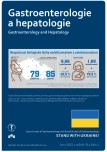Point-of-care method for measuring infliximab and adalimumab trough levels in inflammatory bowel disease patients on biologic therapy
Authors:
Kaštylová K. 1; Černá K. 1; Luxová Š. 2; Šebek P. 3; Lukáš M. 1
Authors‘ workplace:
Klinické a výzkumné centrum pro střevní záněty, Klinické centrum ISCARE a. s. a 1. LF UK v Praze
1; GENNET s. r. o., Praha
2; Tani-Gen s. r. o., Praha
3
Published in:
Gastroent Hepatol 2022; 76(1): 35-41
Category:
doi:
https://doi.org/10.48095/ccgh202235
Overview
Aim of the study: To verify whether the results of infliximab and adalimumab concentration measurements by the point-of-care method ProciseDx correspond with the concentrations determined by enzyme-linked immunosorbent assay (ELISA). Methods: Twenty-three infliximab (IFX) and twenty-two adalimumab (ADL) concentrations were compared. IFX and ADL trough levels were measured by the ProciseDx point-of-care (POCT) system based on the Förster resonance energy transfer (FRET) principle, and by standard immunoassay (ELISA) in a clinical laboratory. Results: Spearman‘s correlation coefficient for IFX R = 0.9400 (P = 0.0001) and the weighted Cohen‘s kappa of 0.93 indicate a good correlation between data measured by two different measurement systems. The same excellent correlation of values was achieved for ADL, where R = 0.9098 (P = 0.0001) and the weighted Cohen‘s kappa is 0.834. Conclusion: The ProciseDx POCT system is a highly reliable method for measuring serum trough IFX and ADL levels in IBD patients. It is easy to operate and fast, it brings more effectiveness to the IBD biological treatment and reduces financial and time burden of this therapy.
Keywords:
infliximab – inflammatory bowel disease – adalimumab – biologic therapy – proactive therapeutic drug monitoring – reactive therapeutic drug monitoring – point-of-care monitoring
Sources
1. Infliximab, Infliximab-dyyb monograph for professionals. [online]. Available from: https: //www.drugs.com/monograph/infliximab-infliximab-dyyb.html.
2. Suchánková H. Terapeutické monitorování koncentrací léčiv v klinické praxi. Prakt Lékáren 2018; 14 (2): 67–69. doi: 10.36290/lek.2018. 012.
3. Malíčková K, Pešinová V, Bortlík M et al. Telemedicína a idiopatické střevní záněty – výsledky pilotního projektu IBD Asistent. Gastroent Hepatol 2020; 74 (1): 18–27. doi: 10.14735/amgh202018.
4. Landis JR, Koch GG. The measurement of observer agreement for categorical data. Biometrics 1977; 33 (1): 159–174.
5. Bortlík M, Ďuricová D, Kohout P et al. Doporučení pro podávání biologické terapie u idiopatických střevních zánětů: třetí, aktualizované vydání. Gastroenterol Hepatol 2016; 70 (1): 11–27. doi: 10.14735/amgh201611.
6. Van Stappen T, Vande Casteele N, Van Assche G et al. Clinical relevance of detecting anti-infliximab antibodies with a drug-tolerant assay: post hoc analysis of the TAXIT trial. Gut 2018; 67 (5): 818–826. doi: 10.1136/gutjnl-2016-313 071.
7. D‘Haens G, Vermeire S, Lambrecht G et al. Increasing infliximab dose based on symptoms, biomarkers, and serum drug concentrations does not increase clinical, endoscopic, and corticosteroid-free remission in patients with active luminal Crohn‘s disease. Gastroenterology 2018; 154 (5): 1343–1351. doi: 10.1053/j.gastro.2018.01.004.
8. Assa A, Matar M, Turner D et al. Proactive monitoring of adalimumab trough concentration associated with increased clinical remission in children with Crohn‘s disease compared with reactive monitoring. Gastroenterology 2019; 157 (4): 985–996. doi: https: //doi.org/10.1053/j.gastro.2019.06.003.
9. Bortlik M, Duricova D, Malickova K et al. Infliximab trough levels may predict sustained response to infliximab in patients with Crohn’s disease. J Crohns Colitis 2013; 7 (9): 736–743. doi: 10.1016/j.crohns.2012.10.019.
10. Cheifetz AS, Abreu MT, Afif W et al. A Comprehensive Literature Review and Expert Consensus Statement on Therapeutic Drug Monitoring of Biologics in Inflammatory Bowel Disease. Am J Gastroenterol 2021; 116 (10): 2014–2025.
11. Ong E, Huang R, Kirkland R et al. Therapeutic Drug Monitoring: Performance of a FRET-Based Point-Of-Care Immunoassay for the Quantitation of Infliximab and Adalimumab in Blood. ChemRxiv. Cambridge: Cambridge Open Engage 2020.
12. Novakovic V, Abdija S, Larsen PB et al. Comparison of the quantum blue reader point-of-care system versus ELISA technique for therapeutic drug monitoring of infliximab levels. Clin Biochem 2019; 74 : 73–75. doi: 10.1016/ j.clinbiochem.2019.10.010.
13. Cherry M, Dutzer D, Nasser Y et al. Point-of-Care Assays Could Be Useful for Therapeutic Drug Monitoring of IBD Patients in a Proactive Strategy with Adalimumab. J Clin Med 2020; 9 (9): 2739. doi: 10.3390/jcm9092 739.
Labels
Paediatric gastroenterology Gastroenterology and hepatology SurgeryArticle was published in
Gastroenterology and Hepatology

2022 Issue 1
- Possibilities of Using Metamizole in the Treatment of Acute Primary Headaches
- Metamizole at a Glance and in Practice – Effective Non-Opioid Analgesic for All Ages
- Metamizole vs. Tramadol in Postoperative Analgesia
- Spasmolytic Effect of Metamizole
- The Importance of Limosilactobacillus reuteri in Administration to Diabetics with Gingivitis
-
All articles in this issue
- Perspective year 2022
- Be optimistic!
- Kvíz z klinické praxe
- Doporučení Pracovní skupiny pro idiopatické střevní záněty pro diagnostiku a medikamentózní léčbu ulcerózní kolitidy
- Complicated course of Crohn’s disease of the small intestine in the patient in the eighth decade of life
- Point-of-care method for measuring infliximab and adalimumab trough levels in inflammatory bowel disease patients on biologic therapy
- Biosimilar treatment in paediatric gastroenterology – current view
- Safety of vedolizumab and ustekinumab in the treatment of pregnant women with inflammatory bowel disease – a multicentre retrospective-prospective observational study
- Remsima SC 120 mg – a new generation of biosimilar drugs
- The importance of home parenteral nutrition in clinical practice – own experience from our workplace
- Desmoid fibromatosis – a rare mesenteric tumor
- The selection from international journals
- Odešla mimořádná osobnost české gastroenterologie – Ivo Skála (17. 12. 1933 – 10. 2. 2022)
- Správná odpověď na kvíz
- Kreditovaný autodidaktický test: IBD
- Gastroenterology and Hepatology
- Journal archive
- Current issue
- About the journal
Most read in this issue
- Desmoid fibromatosis – a rare mesenteric tumor
- Remsima SC 120 mg – a new generation of biosimilar drugs
- The importance of home parenteral nutrition in clinical practice – own experience from our workplace
- Doporučení Pracovní skupiny pro idiopatické střevní záněty pro diagnostiku a medikamentózní léčbu ulcerózní kolitidy
